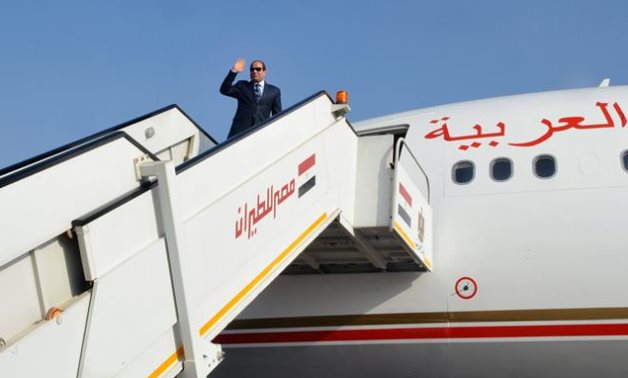
Egypt’s President Sisi on board of EgyptAir flight- press Photo
CAIRO – 6 March 2021: For the first time since the formation of the Sudanese ruling military council, Egyptian President Abdel Fattah El Sisi will officially visit Khartoum on Saturday morning, Presidential spokesman Bassam Rady said in a statement on Saturday.
President Sisi and Head of Sudan's Transitional Military Council (TMC), Lieutenant General Abdel Fattah al-Burhan will hold a summit during which they will discuss the latest developments in some regional issues, particularly the controversial Grand Ethiopian Renaissance Dam (GERD) file, security in the Red Sea and the situation on Sudan's borders.
The visit comes in light of consolidating Egypt's efforts to support Sudan in this critical stage, and of keenness on joint coordination and unification of visions on various issues of common interest, Radi added.
Sudan Akhbar newspaper reported that the two leaders will hold a closed summit at the Sudanese Presidential Palace.
President Sisi is accompanied by Egyptian Foreign Minister Sameh Shoukry and Chief of the Egyptian Intelligence Abbas Kamel in his one-day visit.
Coincidently, a hashtag welcoming Sisi in Khartoum (#Sisi_in_his_second_home) - as if Sudan is considered as his home country- became trending few hours after the Egyptian Presidency Spokesperson announced Sisi’ official visit.
Al-Masry account tweeted that “Egypt and Sudan are one home, one heart and one world.
Meanwhile, Mohamed Samir described in his tweet that Sisi’s visit is a historic one.
Egypt and Sudan have voiced their concern about the possible harms and threats of the controversial Ethiopian Renaissance dam and how the dam will negatively after their water share of the Nile in case Ethiopia abstained from signing a binding and legal agreement on the dam operation and filling its reservoir.
Failure of reaching a binding agreement on filling and operating the dam and the refusal of providing data from the Ethiopian side will significantly negatively affect the operation of the Sudanese Roseires reservoir, said Manager of Roseires reservoir Hamed Mohamed Ali on last week.
In remarks to the Sudanese News Agency (SUNA), Ali said that the Sudanese Roseires dam will depend on the quantities of the river coming from the Renaissance Dam, and thus the absence of a binding and satisfactory agreement for all parties will constitute a great danger.
Sudan’s Roseires dam, which is located near the Sudanese border with Ethiopia, has productive and economic importance in irrigating agricultural projects along the Blue Nile and the Nile, and producing electricity, he added.
This comes while Ethiopia has frequently affirmed it would implement the second filling of the Grand Ethiopian Renaissance Dam next July under any circumstances.
Egyptian Minister of Water Resources and Irrigation Mohamed Abdel-Atti said that Sudan worried because of what happened last year when Ethiopia began filling the dam reservoir without notifying Sudan, adding that Sudan was negatively affected.
In mid-July 2020, Ethiopian authorities unilaterally carried out the first phase of the filling process with 4.9 billion cubic meters; and it is expected that the second phase of the filling would reach 13 billion cubic meters in July.
The dispute among Egypt, Sudan, and Ethiopia dates back to May 2011 when Ethiopia started building the dam; Egypt voiced concern over its water share [55.5 billion cubic meters].
As Democratic Congo is chairing the AU for the year 2021, it is attempting to revive stalling negotiations between Egypt, Sudan, and Ethiopia. However, few hours before Sisi’s official visit to Sudan, Ethoipian Minister of Water, Irrigation and Energy Seleshi Bekele said on Thursday that his country is looking forward to a “win-win solution” for the Grand Ethiopian Renaissance Dam through trilateral negotiation.
Bekele’s remarks came after he hosted a delegation from the Democratic Republic of Congo to discuss the ongoing negotiations with Egypt and Sudan to reach a deal on GERD.
In 2015, the three countries signed the Declaration of Principles, per which the downstream countries should not be negatively affected by the construction of the dam.
In October 2019, Egypt blamed Addis Ababa for hindering a final agreement concerning a technical problem, calling for activating Article No. 10 of the Declaration of Principles, which stipulates that if the three countries could not find a solution to these disputes, they have to ask for mediation.
Washington had brokered tripartite negotiations among the three countries, in the presence of the President of the World Bank (WB) starting from November 6, 2019 until February 27 and 28, 2020.
During these rounds of talks, tangible outcomes were agreed on among the three parties concerning the rules and mechanism of operating the dam and the filling process of the reservoir during drought and prolonged drought; however, an agreement was not sealed.
Constructions in the Grand Renaissance Dam started on April 2, 2011 at a cost of $4.8 billion. The dam is located on the Blue Nile with a capacity of 74 billion cubic meters and is expected to generate up to 6,000 megawatts of power.
Comments
Leave a Comment